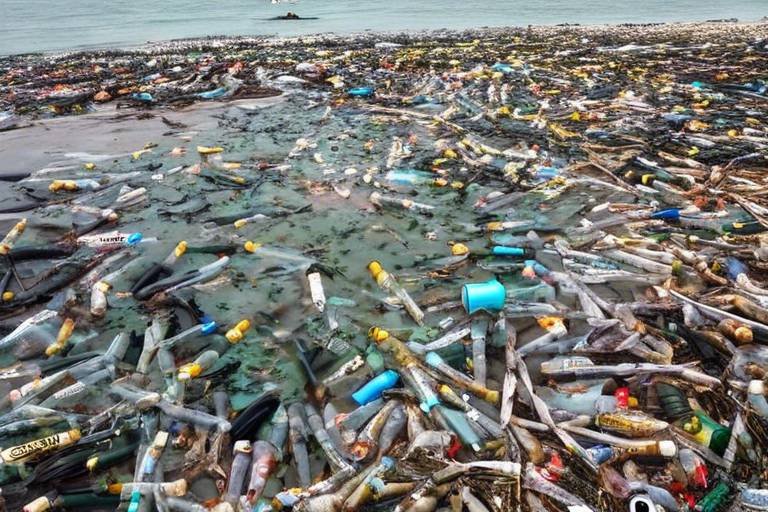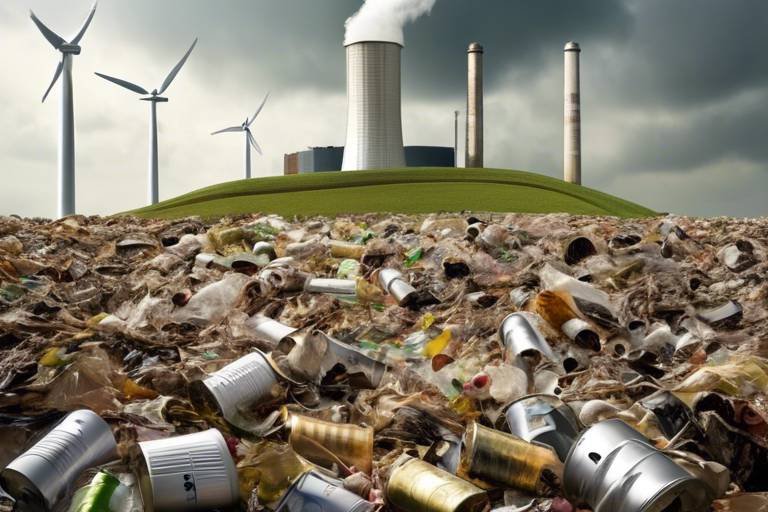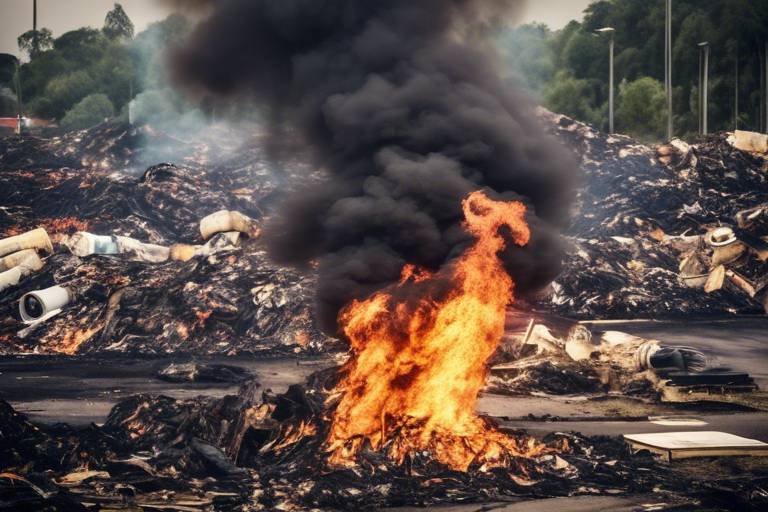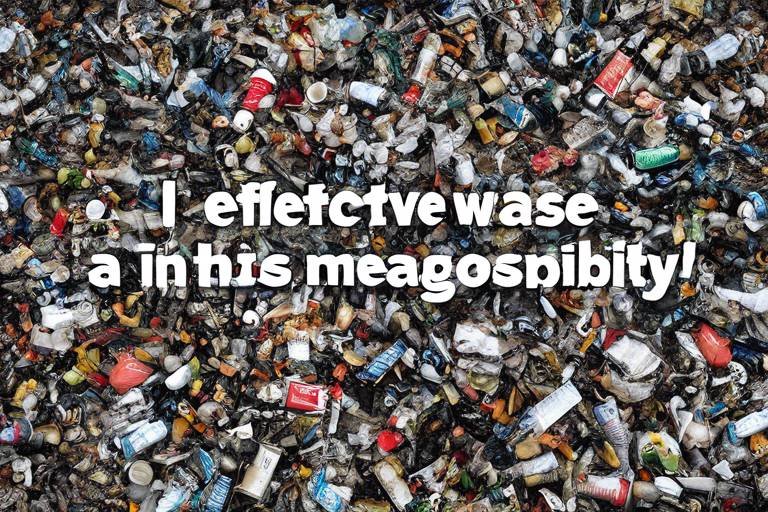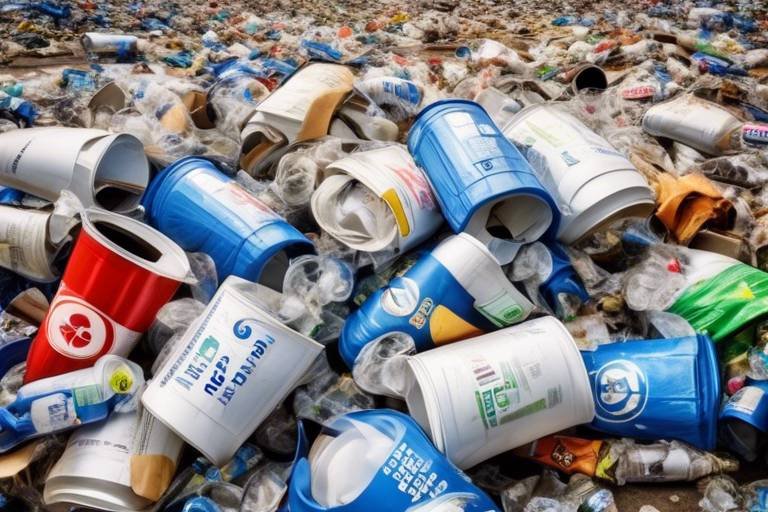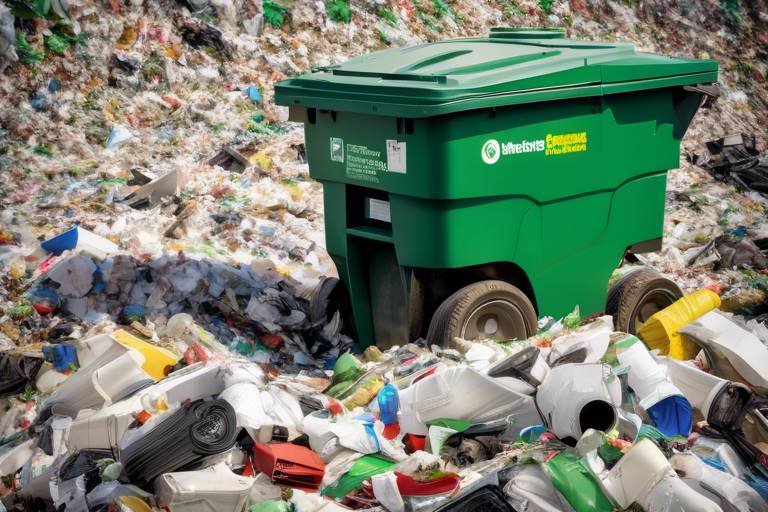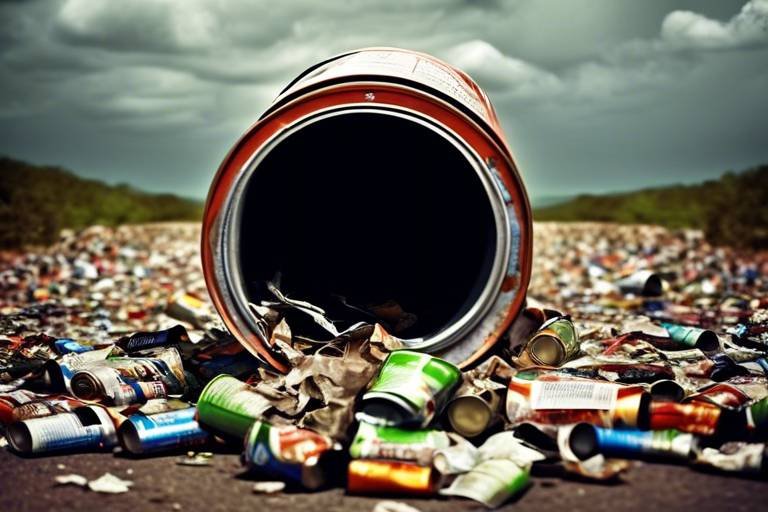Are Plastic Bag Bans Really Helping The Environment
In recent years, the conversation around plastic bag bans has gained significant traction, and for good reason. With our planet grappling with the overwhelming consequences of plastic pollution, many communities have turned to legislation as a means to combat this pressing issue. But the question remains: are these bans truly effective in helping the environment? As we dive deeper into the nuances of this topic, we will explore the environmental impact of plastic bags, the economic implications of such bans, and how public perception shapes their effectiveness. Additionally, we will consider alternative solutions that could complement or even replace these bans in the quest for a cleaner planet.
Plastic bags are notorious for their detrimental effects on our environment. They are lightweight, making them easily carried by the wind, which often results in them ending up in our oceans, parks, and streets. The statistics are staggering: according to a 2019 report by the United Nations, approximately 1 trillion plastic bags are used worldwide each year. This staggering number contributes to significant pollution, harming wildlife and disrupting natural ecosystems. Birds, marine animals, and other wildlife often mistake plastic bags for food, leading to ingestion that can result in injury or death. Bans on plastic bags aim to mitigate these issues by reducing the number of bags that enter our waste systems and ultimately our natural habitats. However, it is essential to assess whether these bans are genuinely effective in achieving their intended goals.
While the primary goal of plastic bag bans is to protect the environment, they also come with a set of economic repercussions that cannot be ignored. For many businesses, particularly small retailers, the transition away from plastic bags can be challenging. The cost of switching to alternatives, such as paper or reusable bags, can strain their budgets. Moreover, consumers may initially resist these changes, leading to potential declines in sales. However, it is worth noting that some businesses have found opportunities within these challenges. For instance, retailers can promote reusable bags as part of their brand identity, fostering customer loyalty and encouraging sustainable practices. This shift in consumer behavior can lead to a new market for eco-friendly products, ultimately benefiting both the environment and the economy.
Retailers face a unique set of challenges and opportunities due to plastic bag bans. On one hand, they must adapt to new regulations and find cost-effective solutions for bagging their products. On the other hand, these changes can lead to enhanced customer satisfaction, as many consumers appreciate businesses that prioritize sustainability. Retailers can manage these challenges by:
- Implementing cost-effective alternatives, such as biodegradable bags.
- Offering incentives for customers who bring their reusable bags.
- Educating customers about the environmental benefits of the ban.
By embracing these strategies, retailers can not only comply with regulations but also position themselves as leaders in the movement towards sustainability.
As bag bans become more widespread, consumer habits inevitably shift. Many shoppers begin to adjust their purchasing behaviors, opting for reusable bags instead of single-use plastic bags. This change can lead to a more conscientious approach to shopping, where consumers are more aware of their environmental footprint. However, the transition is not without its hurdles. Some individuals may forget their reusable bags or find them inconvenient, leading to a temporary dip in compliance. Nevertheless, as more people become accustomed to carrying reusable bags, these behaviors are likely to solidify into long-term habits.
For many retailers, the financial burden of compliance with bag bans can be significant. The costs associated with implementing new policies, such as purchasing reusable or biodegradable bags, can accumulate quickly. Additionally, businesses may need to invest in staff training and customer education, further straining their resources. However, it is crucial to view these costs as an investment in a sustainable future. By adapting to these changes, retailers can not only meet regulatory requirements but also appeal to an increasingly eco-conscious consumer base.
Bag bans can have a profound impact on waste management systems. As fewer plastic bags enter the waste stream, landfills may experience a reduction in volume, leading to more efficient waste management practices. Furthermore, these regulations can encourage improved recycling efforts, as communities look for ways to manage the remaining plastic waste more effectively. However, it is essential to recognize that plastic bag bans are just one piece of the puzzle. Comprehensive waste reduction strategies must also address other sources of plastic pollution to achieve meaningful change.
Public opinion plays a crucial role in the success of plastic bag bans. The effectiveness of these policies often hinges on community attitudes and the level of support they receive. When individuals understand the environmental benefits of bag bans, they are more likely to comply and advocate for their implementation. However, resistance can arise from misconceptions or a lack of awareness about the environmental impact of plastic bags. To foster support for these bans, it is essential to engage in education campaigns that highlight the importance of reducing plastic waste.
Raising awareness about the environmental issues associated with plastic bags is essential for garnering public support. Education campaigns can play a significant role in fostering positive attitudes towards bag bans. By providing information about the harmful effects of plastic pollution and promoting sustainable alternatives, communities can encourage individuals to take action. For example, workshops, social media campaigns, and community events can effectively spread awareness and inspire change.
Despite the benefits, some communities resist plastic bag bans. This resistance can stem from various factors, including a perceived inconvenience, concerns about economic impacts, or simply a lack of understanding of the environmental issues at hand. Policymakers must navigate these challenges by engaging with the community, addressing concerns, and providing clear communication about the benefits of the bans. Building trust and demonstrating the positive outcomes of these regulations can help shift public perception and foster compliance.
While plastic bag bans are a step in the right direction, exploring alternatives to plastic bags is vital for comprehensive waste reduction. Several innovative solutions can complement bag bans, including:
- Biodegradable bags that break down more easily in the environment.
- Incentives for consumers to use reusable bags, such as discounts or rewards programs.
- Innovative packaging methods that minimize plastic use altogether.
By considering a multifaceted approach to reducing plastic waste, communities can create a more sustainable future.
Q: What are the main environmental benefits of plastic bag bans?
A: The primary environmental benefits include reducing plastic pollution, protecting wildlife, and decreasing the volume of waste in landfills.
Q: How do plastic bag bans affect small businesses?
A: While small businesses may face initial costs associated with compliance, they can also find opportunities to promote sustainable practices and attract eco-conscious customers.
Q: Are there effective alternatives to plastic bags?
A: Yes, biodegradable bags, reusable bags, and innovative packaging methods are all effective alternatives that can help reduce plastic waste.

The Environmental Impact of Plastic Bags
Plastic bags, often seen as a convenient solution for carrying groceries and other goods, come with a hefty price tag for our planet. These bags are made from polyethylene, a type of plastic derived from fossil fuels, and their production releases a significant amount of greenhouse gases. Once discarded, plastic bags can take hundreds of years to decompose, leading to a staggering accumulation of waste in landfills and the natural environment. It's alarming to think that a simple shopping bag can persist for generations, polluting our landscapes and oceans.
One of the most pressing environmental issues associated with plastic bags is their impact on wildlife. Animals, both terrestrial and marine, often mistake plastic for food. For instance, sea turtles are known to ingest plastic bags, thinking they are jellyfish. This can lead to severe health complications, including malnutrition and death. Moreover, animals can become entangled in plastic waste, leading to injury or even mortality. The consequences of plastic pollution extend beyond individual species; entire ecosystems can be disrupted as the food chain is affected by the decline of certain species.
Plastic bags also contribute to the phenomenon of microplastics. When plastic bags break down, they do not completely disappear; instead, they fragment into smaller pieces, known as microplastics. These tiny particles are now found in oceans, rivers, and even the air we breathe. Microplastics can be ingested by a wide range of organisms, from plankton to fish, ultimately making their way into the human food chain. The long-term effects of microplastics on human health are still being studied, but the potential risks are concerning.
In response to these environmental challenges, many regions have implemented plastic bag bans as a proactive measure. The goal of these bans is to reduce plastic waste, encourage the use of reusable bags, and promote a shift toward more sustainable practices. For example, cities like San Francisco and countries like Rwanda have seen significant declines in plastic bag usage since enacting their bans. This not only helps to clean up the environment but also fosters a culture of environmental responsibility among consumers.
However, it’s essential to recognize that while banning plastic bags is a step in the right direction, it is not a panacea. The effectiveness of these bans largely depends on public compliance and the availability of alternatives. To truly make a difference, communities must also focus on comprehensive waste management strategies, recycling initiatives, and educational campaigns that inform the public about the importance of reducing plastic consumption. After all, the fight against plastic pollution is not just about banning one item; it’s about changing our relationship with plastic as a whole.
In summary, the environmental impact of plastic bags is profound and multifaceted. From harming wildlife to contributing to climate change, the consequences of plastic bag usage cannot be overlooked. As we strive to create a healthier planet, understanding these impacts is crucial in shaping effective policies and encouraging sustainable behaviors among consumers.

Economic Considerations of Bag Bans
When it comes to plastic bag bans, the environmental benefits are often the first thing that comes to mind. However, it’s crucial to delve deeper into the economic implications these bans bring along. While they aim to protect our planet, they can also stir a pot of financial challenges and opportunities for both consumers and businesses alike.
For starters, let’s talk about the impact on retailers. Many businesses, especially small ones, feel the pinch when these bans are enforced. Suddenly, they have to rethink their logistics and supply chains. The transition from plastic to reusable bags can lead to increased operational costs. Retailers often find themselves in a dilemma—should they absorb these costs, or pass them on to consumers? This decision can significantly impact their profit margins and customer satisfaction.
Interestingly, some retailers see bag bans as an opportunity to innovate. They may introduce branded reusable bags that not only comply with regulations but also serve as a marketing tool. This shift can enhance customer loyalty and create a unique shopping experience. However, for many, it’s a balancing act between sustainability and maintaining a competitive edge. So, how do they navigate this tricky landscape?
Consumer behavior is another area that shifts dramatically in response to bag bans. Shoppers may initially resist the change, grumbling about the inconvenience of bringing their own bags. Yet, over time, many adapt and even embrace this new habit. The transition can lead to a cultural shift where reusable bags become a norm. This change may also encourage consumers to think more critically about their overall purchasing habits, opting for products with less packaging or more sustainable materials.
However, let’s not overlook the costs of compliance. Retailers must invest in new systems to manage the transition effectively. This can include staff training, marketing efforts to promote reusable options, and possibly even higher prices for eco-friendly products. In a recent study, it was found that businesses spent an average of $5,000 to implement compliance measures when transitioning to bag bans. This figure can be a significant burden for smaller businesses operating on tight budgets.
| Cost Factors | Average Cost |
|---|---|
| Training Staff | $1,000 |
| Marketing Campaigns | $2,000 |
| New Equipment | $1,500 |
| Miscellaneous Costs | $500 |
As we can see from the table above, the financial burden of compliance can add up quickly. This is why it’s essential for policymakers to consider these economic implications when drafting and implementing bag bans. They need to ensure that businesses are supported during this transition to minimize negative impacts on the economy.
In conclusion, while the goal of plastic bag bans is to protect the environment, the economic considerations are just as vital. Balancing sustainability with economic viability is no small feat. It requires collaboration between governments, businesses, and consumers to create a system that works for everyone involved. So, the next time you grab your reusable bag, think about the broader picture—it's not just about reducing waste; it's also about supporting our economy.

Impact on Retailers
The impact of plastic bag bans on retailers is a complex tapestry woven with both challenges and opportunities. On one hand, these bans are designed to protect the environment, but on the other, they can create significant operational shifts for businesses. Retailers, especially small and medium-sized enterprises, often find themselves grappling with the immediate economic implications of such regulations. For instance, many shops have to switch from free plastic bags to reusable or biodegradable alternatives, which can lead to increased costs. Imagine a small grocery store that previously provided plastic bags at no charge; now, they must invest in purchasing and stocking new types of bags, potentially cutting into their profit margins.
However, it's not all doom and gloom. Many retailers are discovering that these changes can lead to new opportunities. By adopting eco-friendly practices, businesses can enhance their brand image, attract environmentally-conscious consumers, and even create a loyal customer base that appreciates their commitment to sustainability. For example, a local boutique that starts offering stylish reusable bags may find that customers are not only willing to pay for them but also share their positive experiences on social media, leading to increased visibility and sales.
Moreover, retailers are also finding innovative ways to manage costs while complying with bag bans. Some are implementing customer loyalty programs that reward shoppers for bringing their own bags, which not only encourages sustainable behavior but also fosters a sense of community. Others are utilizing technology, such as mobile apps, to streamline operations and reduce waste. This adaptability illustrates how businesses can thrive even in the face of regulatory changes.
To further understand the impact of plastic bag bans, let's take a look at the following table, which highlights various strategies retailers are employing to adjust to these changes:
| Strategy | Description |
|---|---|
| Reusable Bag Sales | Encouraging customers to purchase reusable bags, often at a discounted rate, to replace single-use plastic bags. |
| Loyalty Programs | Implementing rewards for customers who bring their own bags, incentivizing eco-friendly shopping habits. |
| Awareness Campaigns | Educating customers on the benefits of reducing plastic waste and promoting sustainable alternatives. |
| Partnerships with Eco-Brands | Collaborating with companies that specialize in sustainable products to enhance the store's eco-friendly image. |
In conclusion, while plastic bag bans present certain challenges for retailers, they also open the door to innovative practices that can enhance customer loyalty and brand reputation. The key lies in how businesses choose to adapt to these changes, turning potential setbacks into opportunities for growth. Retailers who embrace this shift towards sustainability can not only comply with regulations but also stand out in a competitive market.

Shifts in Consumer Behavior
When communities implement plastic bag bans, it's not just the environment that feels the impact—consumers do too. These bans trigger a notable shift in how shoppers approach their purchasing habits. Initially, many consumers might feel a sense of inconvenience, as they are now required to remember to bring their own bags. However, this inconvenience often transforms into a new norm, leading to a more conscious shopping experience.
As people adapt to these changes, they start to embrace reusable bags as a staple in their shopping routines. This shift is not merely about remembering a bag; it’s about altering the mindset towards sustainability. Shoppers begin to feel a sense of pride in using reusable bags, viewing them as a badge of honor in their commitment to the environment. It’s almost akin to switching from a regular vehicle to an electric one—initially daunting, but ultimately rewarding.
Moreover, this shift in consumer behavior often leads to increased awareness about other environmental issues. For instance, when shoppers start using reusable bags, they may also become more vigilant about other forms of plastic waste, such as straws and single-use containers. This heightened awareness can foster a culture of sustainability that extends beyond just shopping habits.
Interestingly, studies have shown that consumers are willing to pay more for products that align with their newfound values. A recent survey revealed that 68% of shoppers expressed a preference for brands that prioritize eco-friendly packaging. This indicates a significant shift in purchasing power, where consumers are not just passive participants but active advocates for the environment.
However, it’s important to note that not all consumers are on board with these changes. Some individuals may resist adopting reusable bags due to convenience or cost concerns. To address this, retailers are stepping up their game by offering incentives, such as discounts for customers who bring their own bags. This strategy not only encourages compliance but also helps to ease the transition for those who may be hesitant.
In summary, the shift in consumer behavior triggered by plastic bag bans is a multifaceted phenomenon. It encompasses a transition towards reusable alternatives, an increase in environmental awareness, and a willingness to support sustainable brands. As society continues to grapple with plastic waste, understanding these shifts will be crucial for retailers and policymakers alike in fostering a more sustainable future.
- What are the main benefits of plastic bag bans? Plastic bag bans help reduce environmental pollution, protect wildlife, and promote the use of sustainable alternatives.
- How do plastic bag bans affect consumers? Consumers may initially face inconvenience but often adapt by using reusable bags, leading to increased environmental awareness.
- Are there any economic impacts of plastic bag bans? Yes, they can affect retailers' costs and consumer spending habits, but they can also create opportunities for businesses that offer sustainable products.
- What alternatives exist for plastic bags? Alternatives include biodegradable bags, reusable bags, and innovative packaging solutions that minimize environmental impact.

Costs of Compliance
When it comes to implementing plastic bag bans, the financial implications for retailers can be quite significant. The transition from single-use plastic bags to more sustainable alternatives often involves upfront costs that many businesses may not be prepared for. Imagine a small local grocery store that has relied on plastic bags for years. Suddenly, they are faced with the need to purchase reusable bags or biodegradable options, which can be considerably more expensive. This shift doesn’t just come with the cost of the bags themselves; there are also logistical challenges to consider.
Retailers may find themselves needing to invest in new inventory management systems to track reusable bags or even redesign their checkout processes to accommodate these changes. The initial outlay can be daunting, especially for small businesses that operate on thin margins. In fact, studies have shown that the costs associated with compliance can vary widely depending on the size of the business and the scale of the changes required. For example, a survey conducted among small retailers revealed that:
| Business Size | Estimated Compliance Cost |
|---|---|
| Small (1-10 employees) | $1,000 - $5,000 |
| Medium (11-50 employees) | $5,000 - $15,000 |
| Large (51+ employees) | $15,000 - $50,000 |
While the costs can be substantial, it's crucial to recognize that many businesses also see an opportunity to enhance their brand image by adopting environmentally friendly practices. Shoppers are increasingly favoring retailers that demonstrate a commitment to sustainability, which can lead to increased customer loyalty and even attract new customers. However, the transition period can be tricky, as retailers must balance the financial burden of compliance with the potential long-term benefits.
Moreover, the costs of compliance aren't just limited to the purchase of bags or changes in processes. Retailers also need to consider the training and education of their staff. Employees must be well-versed in the new policies and equipped to handle customer inquiries about the changes. This might involve additional training sessions, which further adds to the overall cost. The key takeaway here is that while the costs of compliance with plastic bag bans can be steep, they may also pave the way for a more sustainable future and a loyal customer base.
- What are the main costs associated with compliance to plastic bag bans?
Compliance costs include the purchase of alternative bags, logistical changes, staff training, and potential inventory management system updates. - Do plastic bag bans affect all retailers equally?
No, the impact varies significantly based on the size of the business and their current practices regarding plastic bags. - Can businesses benefit from plastic bag bans?
Yes, many businesses find that adopting sustainable practices can enhance their brand image and attract environmentally conscious customers.

Effects on Waste Management
The implementation of plastic bag bans has a profound impact on waste management systems across various regions. As communities strive to reduce plastic pollution, these bans are designed to decrease the volume of plastic waste that ends up in landfills and the environment. However, the effects are multifaceted, influencing not only the quantity of waste but also the methods used for waste disposal and recycling.
One of the most significant outcomes of plastic bag bans is the reduction in the overall plastic waste generated. According to recent studies, communities that have enacted these bans have reported a noticeable decrease in the number of plastic bags collected in waste streams. This reduction is crucial, as plastic bags are notorious for being non-biodegradable, taking hundreds of years to decompose. By limiting their use, municipalities can divert a substantial amount of waste from landfills, which is a step towards more sustainable waste management practices.
Moreover, the bans often lead to a shift in consumer behavior, encouraging individuals to adopt more sustainable practices. For instance, when shoppers are required to use reusable bags, they become more conscious of their overall consumption habits. This increased awareness can translate into a broader commitment to reducing waste, as consumers start to consider other areas where they can minimize their environmental footprint.
However, it's important to note that while plastic bag bans can lead to positive changes, they also pose challenges for waste management systems. For example, the transition to reusable bags can create a new type of waste if these bags are not properly managed. Many reusable bags are made from materials that, while more durable, can still contribute to environmental issues if they are not recycled correctly. This highlights the need for comprehensive waste management strategies that address not only plastic bags but also the lifecycle of reusable alternatives.
To effectively manage the transition, waste management authorities may need to invest in education and infrastructure. This includes:
- Implementing recycling programs specifically for reusable bags.
- Educating the public on proper disposal methods for various types of bags.
- Encouraging the use of biodegradable options as a complement to reusable bags.
Additionally, the economic implications of these bans can lead to shifts in waste management funding. As the volume of plastic waste decreases, municipalities may find themselves reallocating resources to address new challenges that arise from the increased use of reusable bags. This could involve developing new recycling facilities or enhancing existing programs to accommodate the changing waste landscape.
In summary, while plastic bag bans are a step in the right direction for waste management and environmental protection, they bring about a complex array of effects. The reduction of plastic waste is a clear benefit, but it necessitates a thoughtful approach to ensure that the solutions implemented are sustainable in the long run. By fostering public awareness and adapting waste management practices, communities can maximize the positive impacts of these bans while minimizing any unintended consequences.

Public Perception of Bag Bans
The success of plastic bag bans is not solely dependent on legislation; it heavily relies on public perception. Communities that embrace these bans often see a significant reduction in plastic waste, while those that resist may struggle with compliance and effectiveness. But what drives these varying attitudes? Is it a matter of environmental awareness, personal convenience, or perhaps a mix of both? Understanding public perception is crucial for policymakers aiming to implement effective regulations.
Many people are becoming increasingly aware of the environmental issues tied to plastic waste. This heightened awareness can be attributed to educational campaigns and media coverage that highlight the detrimental effects of plastic pollution on wildlife and ecosystems. For instance, studies show that communities with robust educational initiatives tend to have higher compliance rates with bag bans. In fact, a survey conducted in cities with bag bans revealed that 70% of residents supported the initiative after learning about its environmental benefits. This suggests that when people are informed, they are more likely to change their behaviors and support sustainable practices.
However, not everyone is on board with plastic bag bans. Some individuals view these regulations as an inconvenience, arguing that they disrupt their shopping habits. For example, the sudden need to remember reusable bags can be a hassle for many. In a recent poll, 30% of respondents expressed frustration over the inconvenience of switching to reusable options. This highlights a critical point: while the environmental benefits are clear, the transition can be challenging for consumers who are accustomed to the convenience of single-use bags.
Moreover, the economic implications of bag bans can also shape public perception. Some consumers are concerned about the potential increase in costs associated with purchasing reusable bags or the fees that some retailers impose for disposable options. This can lead to a perception that these bans are more about generating revenue for businesses rather than protecting the environment. In fact, a study found that communities that implemented fees for plastic bags often faced backlash from customers who felt unfairly targeted. Therefore, it is essential for policymakers to communicate the long-term benefits of these bans clearly and effectively to mitigate such concerns.
In addition to awareness and economic factors, cultural attitudes play a significant role in shaping public perception of bag bans. In some regions, using reusable bags is seen as a badge of honor, a way to align with environmentally conscious values. Conversely, in other areas, the resistance to change can be deeply rooted in tradition and lifestyle. This cultural divide can create challenges for policymakers aiming to implement uniform regulations across diverse communities.
To bridge this gap, it’s vital for local governments to engage with the community through forums, workshops, and social media campaigns. By fostering a dialogue about the benefits of bag bans and addressing concerns directly, communities can cultivate a more positive perception. As public support grows, the effectiveness of these bans is likely to improve, leading to a cleaner, healthier environment for all.
- What are the main benefits of plastic bag bans? Plastic bag bans help reduce plastic pollution, protect wildlife, and encourage the use of sustainable alternatives.
- Are there any downsides to bag bans? Some consumers find them inconvenient, and there can be economic implications for retailers and customers.
- How can communities improve public perception of bag bans? Through education, open dialogue, and addressing community concerns, public support can be enhanced.

Awareness and Education
Raising awareness about environmental issues is essential for public support of plastic bag bans. It's not just about slapping a ban on plastic bags and hoping for the best; it's about educating the community on why these measures are necessary. When people understand the impact of plastic pollution on our oceans, wildlife, and even our health, they are more likely to embrace change. For instance, did you know that millions of marine animals die each year due to plastic waste? This shocking statistic can serve as a wake-up call, prompting individuals to reconsider their daily habits.
Education campaigns play a pivotal role in fostering positive attitudes towards bag bans. These initiatives can take many forms, from community workshops and school programs to social media campaigns. By using relatable stories and visuals, we can paint a vivid picture of the consequences of plastic waste. For example, a local campaign might feature images of sea turtles entangled in plastic bags, driving home the message that our choices matter.
Moreover, effective communication is key. It’s not just about presenting facts; it's about engaging the community in a dialogue. When people feel involved and informed, they are more likely to support initiatives. This can be achieved through:
- Interactive workshops that allow participants to make their own reusable bags.
- Social media challenges that encourage people to share their experiences with reducing plastic waste.
- Collaborations with local businesses to promote discounts for customers who bring their own bags.
In addition to community initiatives, schools can also play a significant role in educating young minds about sustainability. Incorporating environmental education into the curriculum can empower the next generation to make informed choices. Imagine a classroom where students learn about the lifecycle of plastic and its environmental impact; this knowledge can shape their habits for years to come.
Ultimately, the success of plastic bag bans hinges on public awareness and education. The more people know about the issues at hand, the more likely they are to change their behaviors. As we strive for a cleaner, healthier planet, let’s not forget that knowledge is power, and together, we can make a difference.
- What are the main reasons for banning plastic bags?
Plastic bags contribute to pollution, harm wildlife, and take hundreds of years to decompose. Bans aim to reduce these negative impacts. - How do plastic bag bans affect consumers?
Consumers may initially face inconveniences, such as needing to remember reusable bags, but many adapt quickly and appreciate the environmental benefits. - Are there alternatives to plastic bags?
Yes, alternatives include biodegradable bags, cloth bags, and other reusable options that are more environmentally friendly. - How can I support plastic bag bans in my community?
Get involved by attending local meetings, participating in educational campaigns, and encouraging your friends and family to reduce plastic use.

Resistance and Challenges
Despite the growing momentum towards banning plastic bags, there remains a notable resistance in various communities. This pushback often stems from a combination of economic concerns, convenience factors, and a general lack of understanding about the environmental benefits of such bans. Many individuals feel that the bans infringe on their personal freedoms, while others simply find it inconvenient to switch to reusable alternatives. It's crucial to recognize that even within communities that support the ban, there can be significant challenges to achieving compliance and fostering a culture of sustainability.
One of the primary challenges is the economic impact on low-income families. For some, the cost of purchasing reusable bags can be a burden, especially if they need to buy several to accommodate their shopping habits. This economic strain can lead to resentment towards the bans, as people feel they are being forced into a financial commitment that they cannot afford. Additionally, the perception that reusable bags are less convenient can deter compliance. Imagine a busy parent juggling groceries, kids, and a million other tasks; the last thing they want to worry about is whether they remembered to bring their reusable bags.
Moreover, there is a significant educational gap regarding the environmental impact of plastic bags and the benefits of alternatives. Many communities lack effective awareness campaigns that can help residents understand the reasons behind the bans. Without proper education, people may view these regulations as arbitrary rules imposed without justification. This leads to a disconnect between the goals of the bans and the public's understanding and acceptance of them.
To tackle these challenges, communities can consider implementing comprehensive educational programs that highlight the environmental issues caused by plastic bags and the advantages of switching to reusable options. Such initiatives can include:
- Workshops on the impact of plastic waste.
- Incentives for using reusable bags, such as discounts at local stores.
- Community clean-up events that emphasize the importance of reducing plastic use.
In addition to education, it's essential for policymakers to engage with the community to address their concerns. By creating a dialogue and involving residents in the decision-making process, policymakers can foster a sense of ownership and responsibility towards the environment. This approach not only helps in alleviating resistance but also encourages a collective effort towards sustainability.
In conclusion, while the resistance to plastic bag bans can pose significant challenges, addressing the economic, educational, and convenience factors can pave the way for greater acceptance and compliance. By fostering an informed community and promoting sustainable practices, we can work towards a future where plastic waste is significantly reduced.
- What are the main reasons for resistance to plastic bag bans? Many people cite economic concerns, convenience, and a lack of understanding about the environmental benefits.
- How can communities overcome these challenges? Effective education and community engagement are essential to address concerns and promote compliance.
- What alternatives to plastic bags are available? Reusable bags, biodegradable bags, and innovative packaging methods are viable alternatives.

Alternative Solutions to Plastic Waste
As the world grapples with the devastating effects of plastic pollution, finding alternative solutions to plastic bags has become a pressing necessity. While bans on plastic bags are a step in the right direction, they are just one piece of a much larger puzzle. It's time to explore innovative and practical alternatives that not only reduce plastic waste but also promote sustainable practices.
One of the most promising alternatives is the use of biodegradable bags. Unlike traditional plastic bags, which can take hundreds of years to decompose, biodegradable bags are designed to break down more quickly when exposed to natural environmental conditions. They are often made from materials like cornstarch or other plant-based substances, making them a more eco-friendly option. However, it's essential to note that the effectiveness of these bags depends on specific conditions; they require proper composting facilities to decompose effectively.
Another viable solution is to encourage the use of reusable bags. Many retailers and communities are already implementing programs that incentivize consumers to bring their own bags. This not only reduces the demand for single-use plastic bags but also fosters a culture of sustainability. Imagine walking into your favorite store and being rewarded with discounts or points on your loyalty card just for using a reusable bag! This approach not only benefits the environment but also enhances customer loyalty and satisfaction.
Moreover, innovative packaging methods are emerging as a game-changer in the fight against plastic waste. Companies are beginning to explore alternative materials such as hemp, bamboo, and recycled paper for packaging. These materials are not only biodegradable but also offer a unique aesthetic appeal that resonates with environmentally conscious consumers. For instance, some brands have started using mushroom-based packaging, which is both sustainable and compostable. This shift in packaging materials can significantly reduce the overall plastic footprint of products.
To illustrate the potential impact of these alternatives, consider the following table that compares the lifespan and environmental effects of different bag types:
| Bag Type | Decomposition Time | Environmental Impact |
|---|---|---|
| Plastic Bag | 200-1000 years | High pollution risk, harmful to wildlife |
| Biodegradable Bag | 3-6 months (in proper conditions) | Lower pollution risk, compostable |
| Reusable Bag | Indefinite (with proper care) | Minimal impact, promotes sustainability |
| Mushroom Packaging | 30-90 days | Compostable, eco-friendly |
In addition to these alternatives, community-driven initiatives play a crucial role in tackling plastic waste. Local clean-up events, educational workshops, and partnerships with environmental organizations can raise awareness and empower individuals to make conscious choices. When communities come together to address plastic pollution, the impact can be profound. It's like a ripple effect; one small action can lead to significant change.
Ultimately, the transition away from plastic bags requires a collective effort. By embracing biodegradable options, promoting reusable bags, and exploring innovative packaging, we can pave the way for a cleaner, healthier planet. As we move forward, it's essential to remain open to new ideas and solutions that can help us combat plastic waste effectively. After all, every small step counts in this monumental journey toward sustainability.
- What are biodegradable bags made of? Biodegradable bags are typically made from materials like cornstarch or other plant-based substances that break down more quickly than traditional plastic.
- How can I encourage my community to reduce plastic waste? Organize local clean-up events, educational workshops, and collaborate with environmental organizations to raise awareness.
- Are reusable bags really better for the environment? Yes, reusable bags significantly reduce the demand for single-use plastics and have a much lower environmental impact when used properly.
Frequently Asked Questions
- What are the main environmental benefits of plastic bag bans?
Plastic bag bans aim to significantly reduce pollution, protect wildlife, and promote sustainable practices. By limiting the use of plastic bags, we can decrease the amount of plastic that ends up in our oceans and landfills, thereby helping to create a cleaner and healthier environment.
- How do plastic bag bans affect local economies?
While these bans are designed to protect the environment, they can also have economic implications. Retailers may face increased costs for providing alternatives, and some consumers might initially resist the change. However, many businesses adapt by offering reusable bags, which can create new revenue streams.
- What challenges do retailers face when adapting to bag bans?
Retailers often encounter challenges such as managing costs associated with new bag policies and ensuring customer satisfaction. They may need to invest in reusable bag options and educate their customers about the benefits of these changes, which can require additional resources and planning.
- How do bag bans influence consumer behavior?
Bag bans can lead to a shift in consumer habits, prompting shoppers to become more mindful of their purchasing decisions. Many people start to favor reusable bags, which not only reduces plastic waste but also encourages a more sustainable shopping culture.
- What are the costs of compliance for businesses?
Compliance with bag bans can entail significant costs for retailers, including the purchase of alternative bags and the implementation of new systems. Businesses need to balance these costs while maintaining customer satisfaction and adapting to regulatory changes.
- Do bag bans have an impact on waste management systems?
Yes, plastic bag bans can positively influence waste management systems by reducing the volume of plastic waste that ends up in landfills. This can enhance recycling efforts and promote more effective waste reduction strategies, ultimately leading to a more efficient waste management process.
- How does public perception affect the success of bag bans?
Public support is crucial for the success of plastic bag bans. If communities are well-informed and educated about the environmental benefits, they are more likely to comply with new regulations. Conversely, a lack of understanding can lead to resistance and challenges in policy implementation.
- What role does education play in supporting bag bans?
Education is key in fostering positive attitudes towards plastic bag bans. Awareness campaigns can help inform the public about the environmental impacts of plastic bags and the benefits of switching to reusable options, ultimately garnering community support for these initiatives.
- Why do some communities resist plastic bag bans?
Resistance to plastic bag bans can stem from various factors, including concerns about the inconvenience of switching to reusable bags, potential economic impacts, or a lack of awareness about environmental issues. Understanding these concerns is essential for policymakers to address and overcome opposition.
- What are some alternatives to single-use plastic bags?
Alternatives to single-use plastic bags include biodegradable bags, reusable cloth bags, and innovative packaging solutions. Encouraging the use of these alternatives can significantly reduce plastic waste and promote more sustainable practices in communities.



